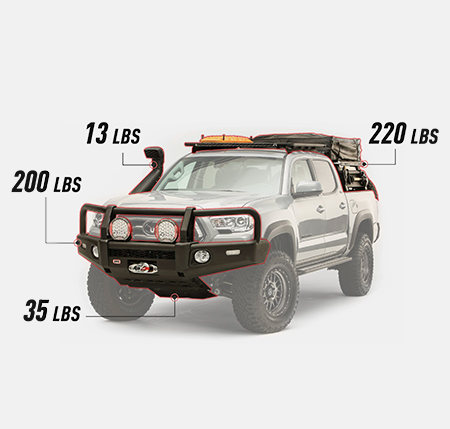OME Nitro+ 2-3 inch Lift Kit for 4Runner (10-24) - Front Shocks Assembly
 Lift Height Details
Lift Height Details
*Lifts may vary, estimated heights.

 Lift Height Details
Lift Height Details
*Lifts may vary, estimated heights.

What is Front Shock Assembly?
Receive your front shock, coils, and top hat preassembled into a ready-to-install unit, making your lift kit installation quick and hassle-free.
Why Choose Our Service?

Constant load is the total additional weight from permanent aftermarket accessories (Bumpers, Winch, Roof Rack, etc) that your vehicle will carry. Choosing the right constant load ensures that your lift kit lasts longer and performs better. Mudify offers 4 set-ups:

When lifting your vehicle, aftermarket UCAs might be necessary depending on the height of the lift:
Keeping factory UCAs can lead to various issues when lifting your vehicle. Switch to aftermarket UCAs in order to:
How to choose the best aftermarket UCAs? You’ll want to mainly consider the ball joint type:

It’s the extra permanent weight your vehicle carries or will carry from accessories you’ll add to it, both on the front and the rear.
Front: Bumper, winch, skid plate, etc.
Rear: Roof rack, rear bumper, etc.
Important: Do not consider payload when choosing your constant load. Payload is the capacity to add temporary weight, such as passengers or cargo. Our lift kits will increase your payload capacity as well, but to choose the proper setup, only consider permanent load (constant load).
How can you determine your constant load?

The lift kit height tells you how much the front of your vehicle will rise compared to its factory height. Typically, the rear is lifted slightly less than the front; the Lift Info Table on the product page will tell you exactly how much.
For example, a 3-inch lift kit would lift the front 3 inches and the rear 2 inches (higher than their factory setup).
Why does the Rear Lift Less?
We all like a nice leveled look, but vehicles usually come with a factory rake, where the rear sits 2 inches higher than the front. So we lift the rear about 1 inch less than the front to achieve a Slight Rake (rear 1” higher than the front instead of 2”).
This setup offers the best of both worlds—keeping your ride’s stability and preventing the rear from sagging while maintaining good looks.
